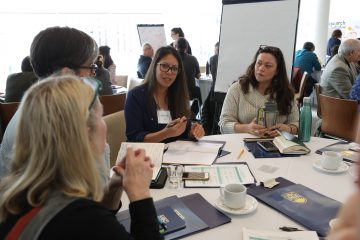 In our December newsletter, we showcased a recent presentation by Dr. Grand Chief Stewart Phillip to students in the faculties of law and First Nations Indigenous Studies as well as staff and faculty at UBC. In his presentation, Grand Chief Phillip spoke about the need for Indigenous people and allies to work together. “If we don’t work together, we won’t succeed,” he said, speaking of this journey toward reconciliation we are all embarking on.
In our December newsletter, we showcased a recent presentation by Dr. Grand Chief Stewart Phillip to students in the faculties of law and First Nations Indigenous Studies as well as staff and faculty at UBC. In his presentation, Grand Chief Phillip spoke about the need for Indigenous people and allies to work together. “If we don’t work together, we won’t succeed,” he said, speaking of this journey toward reconciliation we are all embarking on.
Grand Chief Phillip’s message speaks to the essence of the work we are doing at IRSI. As a research support initiative, we are striving to facilitate approaches to Indigenous, community-led research that respects, honours and benefits those communities. In short, we are trying to assist researchers to be allies to their Indigenous partners.
So, in the context of research, what does ally-ship look like? What makes a good ally? During the Research Principles of Engagement Gathering we held at UBC in October, participants spoke about some of the approaches and qualities of research engagement that will enable researchers to be allies. A few of the key ideas that were shared were:
- Shift the focus off the researcher and onto the community
Traditional research models place researchers in the spotlight and are geared towards the research goals of the researchers. Allied research places community needs first and takes the spotlight off the researcher. Research projects are for communities and not about communities. - Listen and learn
Allies are exceptional listeners. In the context of Indigenous research, this means engaging in projects with open minds and hearts. It involves taking the time to learn the cultural protocols, appropriate language to use (or to avoid), and truly hearing the concerns and needs of the community, as well as the considerable wisdom that community members have to share. It involves listening first, for every step of the research project you are undertaking. - Release expectations and agendas
A common challenge facing researchers working in community is the misalignment of the constraints of their project with the needs of the community. Allied researchers will need to manage their expectations around timelines, project milestones and outcomes. An allied researcher will need to stay open to shifts in direction, and work according to the evolving priorities of the community.
Algonquin Anishinaabe-kwe author and activist Dr. Lynn Gehl, who holds a PhD in Indigenous Studies, created an “Ally Bill of Responsibilities,” a document has been shared widely and is an exceptional resource for anyone partnering with Indigenous communities. Dr. Gehl’s Bill begins:
“Responsible Allies,
- Do not act out of guilt, but rather out of a genuine interest in challenging the larger oppressive power structures;
- Understand that they are secondary to the Indigenous people that they are working with and that they seek to serve. They and their needs must take a back seat;”
The Bill outline 16 ways in which non-Indigenous people can engage respectfully and responsibly with Indigenous communities.
These guidelines, like the Principles discussed at IRSI’s October gathering, are important considerations for all researchers and project partners, not just those new to Indigenous research. In fact, Dr. Gehl’s fifth responsibility suggests that allies:
“Reflect on and embrace their ignorance of the group’s oppression and always hold this ignorance in the forefront of their minds. Otherwise, a lack of awareness of their ignorance could merely perpetuate the Indigenous people’s oppression.”
This is a reminder for even those with years of experience in Indigenous research to constantly check and re-evaluate themselves, acknowledging what they don’t know.
Perhaps most of all it is imperative for the ally to remain humble. To that end, we leave you with the thoughts of award-winning author and blogger on race and gender dynamics Mia McKenzie, who states that ally-ship is not something that can be self-proclaimed. Rather, allies earn their status through demonstrating they can be trusted and by giving respect.
For additional reading about how to be a responsible ally:
Dr. Gehl’s Ally Bill of Responsibilities can be accessed online here.
You can also download the pdf at the bottom of the page. Note: if you wish to share Dr. Gehl’s Ally Bill of Responsibilities, please visit this page to see her sharing instructions.
To learn more about Mia McKenzie, visit her blog Black Girl Dangerous.